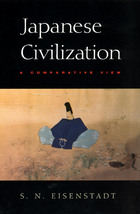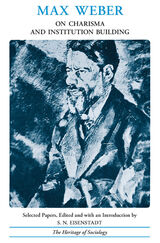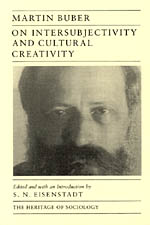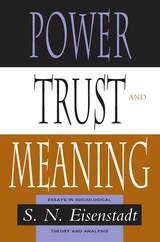4 books about Eisenstadt, S. N.

Japanese Civilization
A Comparative View
S. N. Eisenstadt
University of Chicago Press, 1996
S. N. Eisenstadt, one of the world's leading social theorists, provides a monumental synthesis of Japanese history, religion, culture, and social organization. Equipped with a thorough command of the literature, Eisenstadt explores the Japanese historical legacy and its impact on the Japanese experience of modernity. Eschewing the polemicism of structuralist or culturalist approaches, he expands his investigative framework to include a keenly systematic, broadly comparative analysis. What emerges is an innovative new construction, focusing on the nonideological character of Japanese civilization as well as its infinite capacity to recreate community through an ongoing past.
[more]

On Charisma and Institution Building
Selected Writings
Max Weber
University of Chicago Press, 1968
This selection from Max Weber's writings presents his variegated work from one central focus, the relationship between charisma on the one hand, and the process of institution building in the major fields of the social order such as politics, law, economy, and culture and religion on the other. That the concept of charisma is crucially important for understanding the processes of institution building is implicit in Weber's own writings, and the explication of this relationship is perhaps the most important challenge which Weber's work poses for modern sociology.
Max Weber on Charisma and Institution Building is a volume in "The Heritage of Sociology," a series edited by Morris Janowitz. Other volumes deal with the writings of George Herbert Mead, William F. Ogburn, Louis Wirth, W. I. Thomas, Robert E. Park, and the Scottish Moralists—Adam Smith, David Hume, Adam Ferguson, and others.
Max Weber on Charisma and Institution Building is a volume in "The Heritage of Sociology," a series edited by Morris Janowitz. Other volumes deal with the writings of George Herbert Mead, William F. Ogburn, Louis Wirth, W. I. Thomas, Robert E. Park, and the Scottish Moralists—Adam Smith, David Hume, Adam Ferguson, and others.
[more]

On Intersubjectivity and Cultural Creativity
Martin Buber
University of Chicago Press, 1992
One of the foremost religious and social philosophers of the twentieth century, Martin Buber also wrote extensively on sociological subjects, particularly as these affected his philosophical concerns. Collected here, these writings offer essential insights into the human condition as it is expressed in culture and society.
Buber's central focus in his sociological work is the relation between social interaction, or intersubjectivity, and the process of human creativity. Specifically, Buber seeks to define the nature and conditions of creativity, the conditions of authentic intersubjective social relations that nurture creativity in society and culture. He attempts to identify situations favorable to creativity that he believes exist to some extent in all cultures, though their fullest development occurs only rarely.
Buber considers the combination of open dialogue between human and human and a dialogue between man and God to be necessary for the crystallization of the common discourse that is essential for holding a free, just, and open society together.
Important for an understanding of Buber's thought, these writings—touching on education, religion, the state, and charismatic leadership—will be of profound value to students of sociology, philosophy, and religion.
Buber's central focus in his sociological work is the relation between social interaction, or intersubjectivity, and the process of human creativity. Specifically, Buber seeks to define the nature and conditions of creativity, the conditions of authentic intersubjective social relations that nurture creativity in society and culture. He attempts to identify situations favorable to creativity that he believes exist to some extent in all cultures, though their fullest development occurs only rarely.
Buber considers the combination of open dialogue between human and human and a dialogue between man and God to be necessary for the crystallization of the common discourse that is essential for holding a free, just, and open society together.
Important for an understanding of Buber's thought, these writings—touching on education, religion, the state, and charismatic leadership—will be of profound value to students of sociology, philosophy, and religion.
[more]

Power, Trust, and Meaning
Essays in Sociological Theory and Analysis
S. N. Eisenstadt
University of Chicago Press, 1995
S. N. Eisenstadt is well known for his wide-ranging investigations of modernization, social stratification, revolution, comparative civilization, and political development. This collection of twelve major theoretical essays spans more than forty years of research, to explore systematically the bases of human action and society.
Framed by a new introduction and an extensive epilogue, which are themselves important statements about processes of institutional formations and cultural creativity, the essays trace the major developments of contemporary sociological theory and analysis. Examining themes of trust and solidarity among immigrants, youth groups, and generations, and in friendships, kinships, and patron-client relationships, Eisenstadt explores larger questions of social structure and agency, conflict and change, and the reconstitution of the social order. He looks also at political and religious systems, paying particular attention to great historical empires and the major civilizations.
United by what they reveal about three major dimensions of social life—power, trust, and meaning—these essays offer a vision of culture as both a preserving and a transforming aspect of social life, thus providing a new perspective on the relations between culture and social structure.
Framed by a new introduction and an extensive epilogue, which are themselves important statements about processes of institutional formations and cultural creativity, the essays trace the major developments of contemporary sociological theory and analysis. Examining themes of trust and solidarity among immigrants, youth groups, and generations, and in friendships, kinships, and patron-client relationships, Eisenstadt explores larger questions of social structure and agency, conflict and change, and the reconstitution of the social order. He looks also at political and religious systems, paying particular attention to great historical empires and the major civilizations.
United by what they reveal about three major dimensions of social life—power, trust, and meaning—these essays offer a vision of culture as both a preserving and a transforming aspect of social life, thus providing a new perspective on the relations between culture and social structure.
[more]
READERS
Browse our collection.
PUBLISHERS
See BiblioVault's publisher services.
STUDENT SERVICES
Files for college accessibility offices.
UChicago Accessibility Resources
home | accessibility | search | about | contact us
BiblioVault ® 2001 - 2024
The University of Chicago Press









